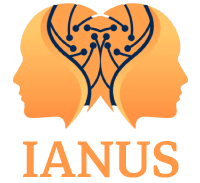The IANUS project actively participated in the OPERAS conference held at the Royal Library of Belgium in Brussels on June 26–27, 2024. The conference aimed to assess various trust dimensions of the Internet, including infrastructure, governance and regulation, mediation, and science, through partnerships with civil society, academia, the tech community, youth, policymakers, and others. A key objective was to establish a multi-stakeholder collaboration model, inspired by community living labs, as a fundamental step in developing responsible Digital Public Infrastructures, a crucial element of the United Nations Global Digital Compact. Additionally, the conference sought to share academic editorial best practices to safeguard the quality and integrity of online content, which is paramount in the age of AI-driven disinformation. The IANUS partners delivered special talks on these essential topics, showcasing our project’s contributions and impact.
In more detail, Hendrik Berghäuser emphasized that science communication can significantly contribute to promoting trust in science, while questionable communication practices can erode this trust. Within the IANUS research, many partners focused on analyzing challenges and risks in science communication concerning public trust and identified opportunities for responsible communication of scientific results.
Moreover, Julija Baniukevič highlighted the critical role of collaboration between scientists, policymakers, and communicators in effectively conveying science and technology-related information during crises. She emphasized that coordination among these key stakeholders enhances public understanding, trust, and response to critical scientific issues in moments of urgency and uncertainty.
Furthermore, Simone Driessen explored the consequences when science communicators, such as those behind the YouTube channel and scicomm organization Kurzgesagt, admit to oversimplifying their work. In her presentation, she discussed Kurzgesagt’s video “We lied to you… and we’ll do it again!” which candidly addresses their approach. Despite their admissions, their work is positively reviewed by viewers, illustrating the effectiveness of their candid approach and the long-tail impact of responsible digital science communication.
Last but not least, Amalia Kallergi and Laurens Landeweerd questioned whether co-creation and participation are suitable tools to counter misinformation. They highlighted the origins of these paradigms and the various rationales behind them. Co-creation and participatory initiatives can be meaningful but are not primarily meant to aid stakeholders in finding the right information, nor can they reach the large sections of society affected by misinformation.
The IANUS project’s active participation in the OPERAS conference, through engaging talks, the organization of the Science track, and a co-creation workshop, underscored its commitment to fostering trust in digital infrastructures and science communication. Through collaborative efforts and insightful contributions, IANUS highlighted the importance of multi-stakeholder partnerships in addressing key challenges in the digital age.
